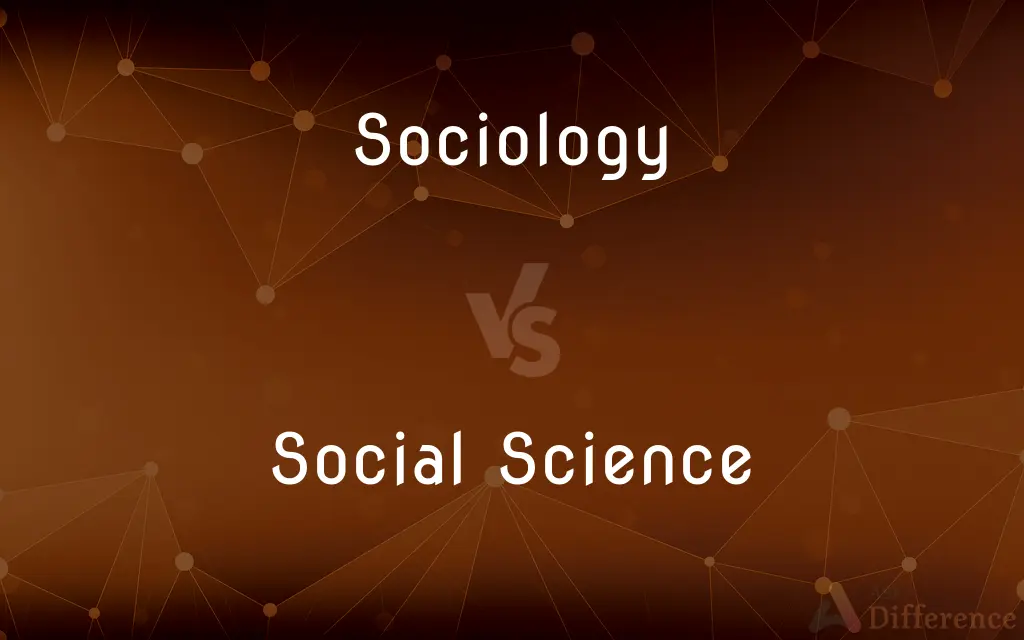Sociology vs. Social Science — What's the Difference?
By Fiza Rafique & Maham Liaqat — Published on March 3, 2024
Sociology focuses on society's structures, relationships, and functions, while Social Science is a broader field that includes sociology, psychology, anthropology, and more, studying various aspects of human society and behavior.

Difference Between Sociology and Social Science
Table of Contents
ADVERTISEMENT
Key Differences
Sociology is a discipline within Social Sciences that specifically examines societal structures, social relationships, cultural norms, and the development and functioning of human society. It aims to understand how human actions and consciousness both shape and are shaped by surrounding cultural and social structures. Sociology often employs various research methods, including surveys, observations, and interviews, to gather data on social phenomena.
Social Science, on the other hand, encompasses a wider range of academic disciplines that study human society and social relationships. Besides sociology, it includes psychology (the study of the human mind and behavior), anthropology (the study of humans, past and present), economics (the study of production, distribution, and consumption of goods and services), political science (the study of politics and government), and more. Each of these disciplines uses its own methodologies to explore different facets of human life and society.
Sociology focuses on understanding the social dynamics and structures at both macro (large scale) and micro (individual level) levels, while Social Science as a whole addresses a broader spectrum of inquiries. It investigates everything from the economic behaviors of nations to the psychological processes of individuals, the political systems governing societies, and the cultural practices that define communities.
The relationship between sociology and the broader field of Social Science is one of specificity versus breadth. Sociology delves deep into the complexities of social interactions and societal constructs, seeking to uncover patterns and principles that govern human behavior within a societal context. Social Science, by encompassing a variety of disciplines, offers a multifaceted view of human life, drawing on diverse methodologies and theoretical frameworks to provide a comprehensive understanding of society at large.
The distinction also lies in the approach and focus areas. Sociology's intense focus on societal structures provides insights into issues like social inequality, group dynamics, and social change. In contrast, Social Science, with its broader scope, allows for a more interdisciplinary approach, integrating insights from sociology with those from its other disciplines to tackle complex societal issues from multiple angles.
ADVERTISEMENT
Comparison Chart
Focus
Society's structures, relationships, functions
Broad study of human society and behaviors
Disciplines Included
Part of Social Science
Includes sociology, psychology, anthropology, etc.
Methodologies
Surveys, observations, interviews
Varied, including statistical analysis, ethnography
Level of Analysis
Both macro (societal) and micro (individual)
Across different scales, depending on discipline
Key Concerns
Social inequality, group dynamics, social change
Human behavior, societal structures, cultural practices
Compare with Definitions
Sociology
A discipline focusing on the analysis of societal structures and their impact on human interactions.
In sociology, researchers might study the effects of social media on community engagement.
Social Science
An umbrella term for disciplines studying human society and social relationships.
Social Science encompasses economics, political science, and sociology.
Sociology
The analysis of cultural norms and values.
Sociologists study the role of traditions in shaping social identities.
Social Science
The investigation of cultural differences and human development.
Anthropologists explore cultural practices across societies to understand human diversity.
Sociology
The study of social life, social change, and the social causes and consequences of human behavior.
Sociology explores how social influences affect individual behaviors.
Social Science
The exploration of human interactions and societal structures.
Social Science researches how governments influence economic stability.
Sociology
The examination of group dynamics and social institutions.
Sociology investigates how educational systems shape societal norms.
Social Science
The field that includes the scientific study of human behavior and societies.
Psychologists and anthropologists contribute to social science by studying different aspects of human actions and cultural practices.
Sociology
The exploration of social inequality and stratification.
Sociology examines the disparities in wealth distribution within societies.
Social Science
The study of economic systems and political structures.
Economists and political scientists analyze the factors driving economic growth and political stability.
Sociology
The study of human social behavior, especially the study of the origins, organization, institutions, and development of human society.
Sociology
Analysis of a social institution or societal segment as a self-contained entity or in relation to society as a whole.
Sociology
A social science that studies society, human social interaction, patterns of social relationships, and the interactions of culture. Through both theory and applied research, it engages subject matters across a range of microanalysis, mesoanalysis, and macroanalysis.
Sociology
That branch of philosophy which treats of the constitution, phenomena, and development of human society; social science.
Sociology
The study and classification of human societies
Common Curiosities
Can sociology and other social sciences overlap in their studies?
Yes, sociology often overlaps with other social sciences in interdisciplinary studies, integrating various perspectives to understand complex societal issues.
What is the main focus of sociology?
Sociology focuses on analyzing societal structures, social relationships, and how they influence human behavior.
Why is social science important?
Social Science is vital for understanding the complexities of human behavior, societal structures, and cultural practices, informing policies and practices that improve societal well-being.
How does social science differ from sociology?
Social Science is a broader field that includes sociology among other disciplines like psychology and anthropology, each with its focus on different aspects of human society.
What methodologies are common in sociology?
Common methodologies in sociology include surveys, observations, and interviews to study social phenomena.
What kind of jobs can a sociology graduate pursue?
Sociology graduates can pursue careers in social work, education, public policy, research, and non-profit organizations, among others.
How do social sciences impact public policy?
Social sciences impact public policy by providing evidence-based research that informs policy decisions, aiming to address societal challenges effectively.
What distinguishes anthropology from sociology within social science?
Anthropology focuses on human cultures, their development, and variations across time and place, while sociology concentrates on contemporary social structures and relationships.
Is economics considered a social science?
Yes, economics is a social science that studies the production, distribution, and consumption of goods and services.
How do social scientists contribute to society?
Social scientists contribute by providing insights that inform public policy, enhance social welfare, and promote understanding across cultural divides.
What challenges do social scientists face in their research?
Social scientists face challenges such as ethical considerations, ensuring representativeness in studies, and adapting methodologies to rapidly changing social landscapes.
What role does political science play within social science?
Political science examines governance systems, political activities, and public policies, contributing to a comprehensive understanding of societal operations and challenges.
How can studying social sciences benefit individuals?
Studying social sciences can enhance critical thinking, understanding of societal dynamics, and awareness of cultural diversity, benefiting personal development and civic engagement.
Can psychological studies influence sociological research?
Yes, psychological insights into human behavior can enrich sociological research by adding depth to the understanding of individual actions within a social context.
What is the significance of interdisciplinary studies in social science?
Interdisciplinary studies allow for integrating knowledge across social sciences, leading to more holistic insights into complex societal issues.
Share Your Discovery

Previous Comparison
Old World Monkeys vs. New World Monkeys
Next Comparison
Atomic Oxygen vs. Molecular OxygenAuthor Spotlight
Written by
Fiza RafiqueFiza Rafique is a skilled content writer at AskDifference.com, where she meticulously refines and enhances written pieces. Drawing from her vast editorial expertise, Fiza ensures clarity, accuracy, and precision in every article. Passionate about language, she continually seeks to elevate the quality of content for readers worldwide.
Co-written by
Maham Liaqat















































